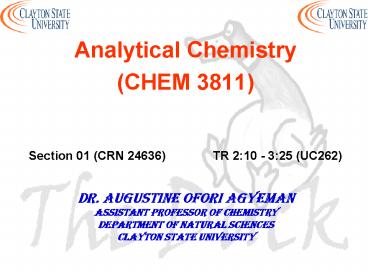Analytical Chemistry - PowerPoint PPT Presentation
1 / 19
Title:
Analytical Chemistry
Description:
... Pre-medicine, Pre-pharmacy, Forensic Science, Forestry, Engineering, etc) ... The central science (it merges into physics and biology) ... – PowerPoint PPT presentation
Number of Views:2900
Avg rating:3.0/5.0
Title: Analytical Chemistry
1
- Analytical Chemistry
- (CHEM 3811)
- Section 01 (CRN 24636) TR 210 - 325 (UC262)
DR. AUGUSTINE OFORI AGYEMAN Assistant professor
of chemistry Department of natural
sciences Clayton state university
2
CONTACT INFORMATION
- My homepage is http//a-s.clayton.edu/aagyeman/
- Email aagyeman_at_clayton.edu
- Office Faculty Hall, A31B
- Phone (678) 466 4793
- Office Hours TR 900 - 1000 am 330 - 530
pm or by appointment
3
COURSE POLICIES
- Make sure you sign in each day you come to class
- Under no circumstances should a student sign in
for someone else - If you signed up for lab, you need to go to lab
or you will be turned in as no show - If you already passed the lab, see Dr. Michelle
Furlong to have the lab removed from your schedule
4
COURSE POLICIES
- If you are not in the right class, request a
change (on-line in the duck) - Give me a feed back
- Attendance
- Attend and participate in every class meeting
- Inform me via email if you cannot attend a class
in a particular day - Habitual absentees may be penalized
- Habitual tardiness will not be tolerated
- I am here to help you contact me any time, any
day take good advantage of that lets build a
healthy relationship
5
COURSE POLICIES
- Just coming to class is not enough
- Download, print and read course materials before
coming to class - Pay attention to the instructor
- Participate in class activities (try to answer
questions, be involved in class discussions) - Ask questions
- Join group discussions
- Read notes and other materials everyday and solve
a lot of questions - Turn in every homework given you (submit on or
before due dates) - Always be prepared for quizzes and exams
- All the above are still not enough
6
COURSE POLICIES
- Notebook computers should not be opened unless
authorized to do so - Computers and/or cell phones cannot be used as a
calculator for exams - Cell phones must be completely turned off
7
COURSE POLICIES
- Academic Misconduct
- Common forms cheating, plagiarism
- Academic dishonesty will result in a grade of
zero for the work involved and reported to the
office of Student Life/Judicial affairs - Disruptive behavior (abusive, threatening,
profane) will not be tolerated - No eating, drinking, or smoking in the classrooms
8
COURSE POLICIES
- Grades
- 3 examinations at 100 each 300
- Quizzes 100
- Term paper 100
- Homework 100
- Final Exam (comprehensive) 200
- Total 800
- Late assignments will be penalized (10 per day)
- Bonus quizzes may be given throughout the
semester to help students earn additional points
9
COURSE POLICIES
- Grades
- Midterm grades reflect about 20 of total grade
- Students may choose to withdraw
- Withdrawal deadline is Mach 6, 2009
- Must fill official withdrawal form (Registrars
office) - No grades will be given out over phone or email
- Complete student survey and course/instructor
evaluation at the end of semester
10
COURSE POLICIES
- Grades
- A 90 or greater
- B 80 - 89
- C 70 - 79
- D 60 - 69
- F less than 60
11
COURSE POLICIES
- Tentative Course Schedule
12
INTRODUCTION
- Course Description
- CHEM 3811 (one-semester elective course)
- Covers classical quantitative determination
methods - Designed for SCIENCE MAJORS (Chemistry, Biology,
Physics, Pre-medicine, Pre-pharmacy, Forensic
Science, Forestry, Engineering, etc) - Major topics include volumetric anf gravimetric
analysus, equilibrium calculations, acid-base
chemistry, electrochemistry, and instrumental
methods
13
INTRODUCTION
- Course Objectives
- To apply the basic concepts of chemistry to the
solution of conceptual and quantitative problems.
- To acquaint the students with some of the
fundamental techniques and state-of-the-art
applications of quantitative analysis. - To develop efficiency in planning and execution
of laboratory techniques. - To develop the ability to solve problems through
logical thought and organized reason
14
INTRODUCTION
- Course syllabus
- Note prerequisites and co-requisites
- Prerequisite CHEM 1212 and CHEM 1212L
- Co-requisite None
- See me after class if you do not meet them
15
INTRODUCTION
- Textbook
- Haris, Daniel C., Exploring Chemical Analysis,
4th edition, W. H. Freeman and Company, New York,
2009. - Chapters 1 23 (some selected chapters)
16
INTRODUCTION
What Is Chemistry? - The central science (it
merges into physics and biology) - The study of
matter and energy and the interactions between
them - The branch of the natural sciences
concerned with the characteristics,
composition, and transformations of matter. -
Everything we hear, smell, taste, see, and touch
involves chemistry and chemicals (matter)
17
INTRODUCTION
- Divisions
- - Analytical (methods of analysis of matter)
- Physical (theory and concepts of chemical
problems) - - Organic (compounds of carbon)
- - Inorganic (compounds of elements other than
carbon) - - Biochemistry (compounds of living matter)
18
INTRODUCTION
What Is Analytical Chemistry? - Identification
and quantification of the constituents of
matter - Study of the chemical composition of
materials - Analysis of chemicals for their
composition and structure
19
INTRODUCTION
- Why Study Analytical Chemistry?
- - To understand the chemical composition of all
matter - - Plays important role in the pharmaceutical
industry - (discovery of new drugs)
- - Quality control of industrial manufacturing
- Environmental monitoring
- - Biomedical applications






























